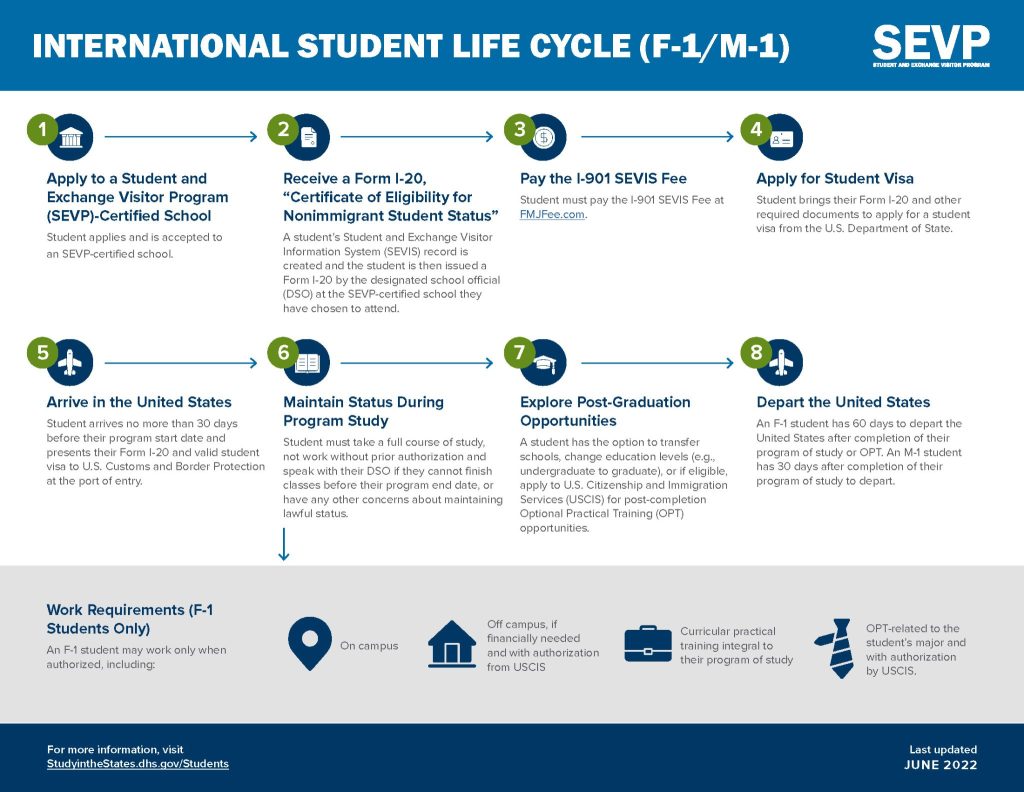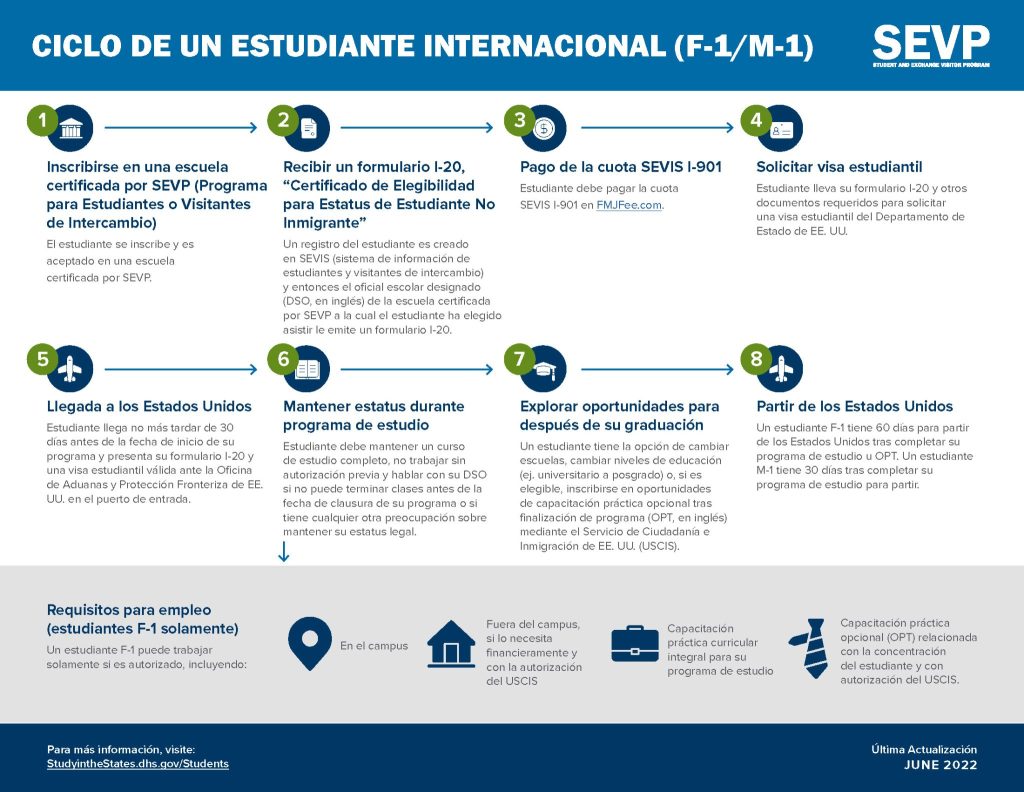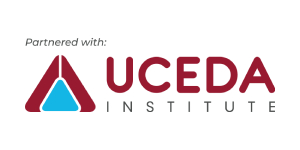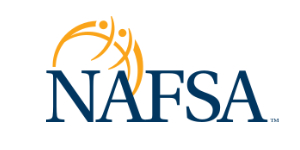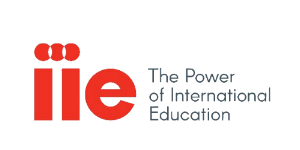Prepare for the F-1 Visa Interview
Points to Remember
The F-1 visa is a “non-immigrant” visa category. However, the interviewer will view you as an “intending immigrant” until you demonstrate strong reasons to return after study. Be ready to explain family, work, property, and career prospects in your country.
The interviewer will assume that you intend to move to the United States permanently, and you must demonstrate that this is not your intention. You are a non-immigrant. You must be able to show that your reasons for returning to your home country are stronger than the reasons for remaining in the United States, and that you intend to depart the United States at the conclusion of your studies.
“Ties” to your home country are the things that connect you to your hometown, homeland, or current place of residence. Your ties could be your job, family, owning a house or apartment, financial prospects that you own or will inherit, investments, etc.
As a prospective student, be prepared to talk about your future, life plans, family or other relationships, educational objectives, and career prospects in your home country. Each person’s situation is different, of course, and there is no magic explanation or single document, certificate, or letter which can guarantee visa issuance.
*If you have a relative or sponsor in the United States, be extra prepared to show ties to your home country.
If you are coming to the United States to study intensive English, be prepared to explain how English will be useful for you in your home country. If you are not able to explain the reasons why you will study English in the United States, you may not succeed in convincing the consular officer that you are indeed planning to study, rather than to work or stay in the United States.
Why do you want to study English in the United States?
How will English be useful for you in your home country?
What are your plans for studying in the United States and beyond?
How does studying English in the United States relate to your career goals and employment prospects when you return home?
Explain the reasons why you want to study at UCEDA in the United States. UCEDA is a school dedicated to the needs of international students learning English as a Second Language. It is close to New York City and Washington DC, important places where you can learn about American history and culture. The classes include students from all around the world. UCEDA has more than 30 years of experience and is accredited by CEA. The program prepares students to certify their English proficiency on the CEFR scale, which is recognized around the world.
Why did you choose to study at UCEDA?
Why do you want to study in New Jersey / Connecticut / Virginia?
How does studying at UCEDA relate to your career goals and employment prospects when you return home?
The consular officer wants to interview you, not your family. A more positive impression is created if you are prepared to speak on your own.
Generally parents or family members will not accompany an applicant into to the visa interview, however you may check with the consulate about the waiting area and any special rules or procedures for non-applicant family members to accompany you.
Interviews are often very short, sometimes just a couple of minutes, so keep your answers to short and on-point. Respond precisely and concisely to the consular officer’s questions and statements.
Consular officers are under considerable time pressure to conduct a quick interview. They often make a decision on the impressions they form during the first minute of the interview. What you say first and the first impression you create are critical to your success.
Know your specific situation and document history.
How will you pay for your studies and the cost of living in the United States? Who is your sponsor?
You should bring the following documents to present to the consular officer:
Your Form I-20 and I-901 Receipt
Passport valid for at least 6 months beyond your stay
Form DS-160, “Nonimmigrant Visa Application,” confirmation page
Department of State visa application fee payment receipt, if you are required to pay before your interview
One printed photo in the prescribed format
Acceptance letter from UCEDA
Transcripts, diplomas, degrees, or certificates from other schools you attended (if applicable)
Financial documentation demonstrating your ability to pay educational, living and travel costs
It should be immediately clear to the consular officer what written documents you are presenting and what they mean. Lengthy written explanations cannot be quickly read or evaluated. Remember that you will only have 2-3 minutes of interview time, maximum.
For details and guidance on what financial documents are needed, please contact your International Student Advisor at UCEDA. The financial information indicated on your Form I-20 should match the evidence provided to the consular officer.
Student visas are for study first. You must be able to explain your plan to finish your program and return home.
Work opportunities for F-1 students are extremely limited. F-1 students enrolled in intensive English programs may not work off-campus except in extraordinary circumstances when approved by U.S. Citizenship and Immigration Services (USCIS). F-2 dependents cannot work.
Spouses and children? F-2 dependents cannot work in the United States. Be prepared to explain what your spouse intends to do with his or her time while in the United States. Volunteering in the community and attending school part-time are permitted activities for F-2 dependents.
How will your family support themselves while you are in the United States?
If your spouse or children are remaining behind in your country, be prepared to explain how they will support themselves in your absence. This can be especially difficult to explain if you are the primary source of income for your family. If the consular officer gains the impression that you intend to support your family with money you may earn during your studies in the United States, your student visa application will almost certainly be denied.
If your family decides to join you at a later time, it may be helpful to have them apply at the same post where you applied for your visa, but that is not always required if your family is living in another district.
Applicants from countries suffering economic problems or from countries where many students have remained in the United States long-term often have more difficulty getting visas. Statistically, applicants from those countries are more likely to be asked about job opportunities at home after their study in the United States.
Review your country’s specific requirements on the U.S. consulate’s website. Several U.S. consulates around the globe have created YouTube videos which explain the visa process at their specific posts. Always check your specific U.S. embassy or consulate to see if a new video is available.
Also be sure to check the U.S. State Department’s Visa Appointment and Processing Wait Times web page, to find average visa appointment and processing wait times at the consulate where you will be applying for your visa.
A ten-digit fingerprint scan is taken of applicants immediately preceding the visa interview, and applicants must attest to the following under penalty of perjury (See 9 FAM 403.3-6, Biometric Signature and Affirmation of DS-160 NIV application):
“By submitting my fingerprint, I am certifying under penalty of perjury that I have read and understood the questions in my visa application and that all statements that appear in my visa application have been made by me and are true and complete to the best of my knowledge and belief. Furthermore, I certify under penalty of perjury that I will tell the truth during my interview and that all statements made by me during my interview will be complete to the best of my ability.”
You may be confident in your answers, however always be polite, and demonstrate appropriate respect for authority. Do not engage the consular officer in an argument.
If you are denied a student visa, ask the officer for a list of documents he or she would suggest you bring in order to overcome the refusal, and try to get the reason you were denied in writing. See: U.S. Department of State’s explanation of visa denials
The information contained herein was adapted from guidance provided by NAFSA: Association of International Educators, last updated/reviewed in August 2025.


